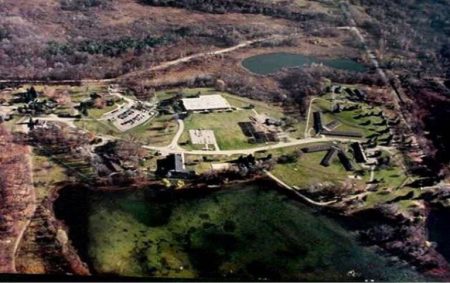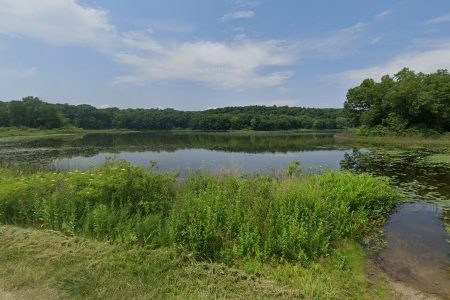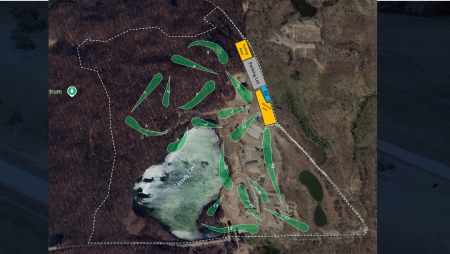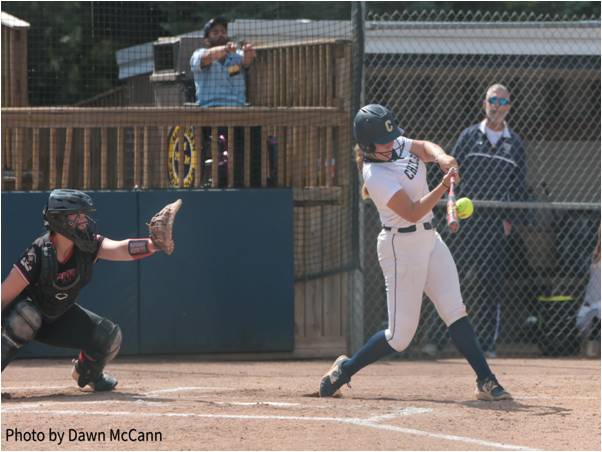Photo: Site of the former Cassidy Lake correctional facility on Waterloo Road. Google Street View.
The future of Cassidy Lake in the Waterloo State Recreation Area has become the center of a growing debate, as community advocates push for a world-class disc golf course and multi-use trails while state officials lean toward modest improvements like a boat dock and primitive campsites. At stake is whether 85 acres of land—once home to the Cassidy Lake Correctional Facility—will be transformed into a regional recreation destination or remain largely underdeveloped.
From Prison Camp to Recreation Potential
The Cassidy Lake property, an 85-acre parcel in the Waterloo State Recreation Area, once housed the Michigan Department of Corrections Cassidy Lake Correctional Facility. Acquired by the Michigan Department of Natural Resources (MDNR) in 2023, the site was cleared of buildings and identified for recreational use. Former MDNR Parks and Recreation Division Chief Ron Olson explained in 2024 that the disturbed land offered “opportunities to do some more active recreational things there,” including disc golf, trails, and a small boat launch.
With zoning already designated for outdoor recreation and no restrictions related to the Eastern Massasauga rattlesnake that exist in other parts of Waterloo, Cassidy Lake quickly became the focus of proposals for expanded public use.

Jones Brings Experience to the Table
Jason Aric Jones, a former governor’s appointee to the Michigan Trails Advisory Council and founder of the DTE Energy Foundation Trail, stepped in to advocate for the disc golf and mountain biking communities. “Because of my experience with DTE, and because I know how the DNR works, I started a 10-year planning process with a stakeholder group back in July of 2024.”
Jones said the meeting brought together mountain bikers, disc golfers, and DNR representatives. Working with A3 Disc Golf Club and professionals from DiscGolfPark, a draft layout was prepared for an 18-hole tournament-level course.
Jones emphasized sustainability, saying, “We talked about some real cutting-edge, sustainable things. For example, not pouring concrete tee pads, like they have in Europe. The reduced concrete makes it more environmentally friendly.”

The Master Plan Process
Despite early optimism, Jones described a breakdown in communication as MDNR’s 10-year master plan for Waterloo evolved. “Basically, they didn’t put us in the first draft for either user group, like we wanted. We got assurances that we’d be included, but at the next meeting, Cassidy wasn’t on the agenda then either.”
When the final plan was approved in mid-2025, it prioritized a small boat dock, primitive campsites, and limited parking improvements at Cassidy Lake. “Basically, not to do much of anything. Basically, right now, it’s my understanding, the long-term plans here are to put in a boat dock and then grade it out a little bit for some overflow parking. And then also put in a couple of camp rings there.”
Jones and other stakeholders felt the process disregarded public input from surveys and working sessions. “We feel like we were kind of done dirty, you know, and they’re just trying to shove everything under the rug and stonewall it,” he says.

Community and Regional Support
Local and regional organizations rallied behind the Cassidy Lake disc golf concept. Letters of support came from the Paul McBeth Foundation, Southern Michigan Outdoors, and Destination Ann Arbor, all pointing to disc golf’s growing popularity and economic potential.
Destination Ann Arbor noted that a course at Cassidy Lake could replicate the Toboggan Disc Golf Course’s $2.5 million impact at Kensington Metropark. The Paul McBeth Foundation pointed to Detroit’s Palmer Park course, which has already logged over 26,000 tracked rounds.
Jones underscored the absence of opposition: “We’ve had great support from all these different entities. It’s not like we’re fighting some organized opposition. There have been no substantive comments against the disc golf idea.”
Frustrated that disc golfers and mountain bikers were not being heard in the Waterloo master planning process, Jones and other stakeholders turned to State Senator Sue Shink for help. “To her credit… she called a meeting with the DNR, which we had on June 30 of this year.”
The session brought together representatives, including the president of the A3 Disc Golf Club, Carl Dumas of the Potawatomi Mountain Biking Association, and DNR officials Scott Pratt from Southern Michigan operations and Shane Morris, district manager for Waterloo, Brighton, and Pinckney. According to Jones, Pratt responded positively to the Cassidy Lake concept, but Morris steered the discussion toward redeveloping the existing, outdated Big Portage Lake disc golf course instead.
Looking Ahead
The MDNR has signaled its willingness to revisit the outdated Big Portage Lake disc golf course, but stakeholders argue Cassidy Lake offers a better opportunity. As Jones summarized, “That whole area is 85 acres with a lot of promise. It’s zoned outdoor recreational, so let’s do something for the community that’s a recreational value.”
The future of Cassidy Lake remains unresolved, but the process has ignited a broader conversation about how Michigan balances tradition with emerging outdoor recreation. For supporters, the site represents a rare chance to transform underutilized land into a regional destination for disc golf, trails, and tourism. For the DNR, it underscores the challenge of managing competing priorities within finite resources. How that balance is struck will shape not only Cassidy Lake’s future, but also the role of active recreation in state lands across Michigan.



 8123 Main St Suite 200 Dexter, MI 48130
8123 Main St Suite 200 Dexter, MI 48130


